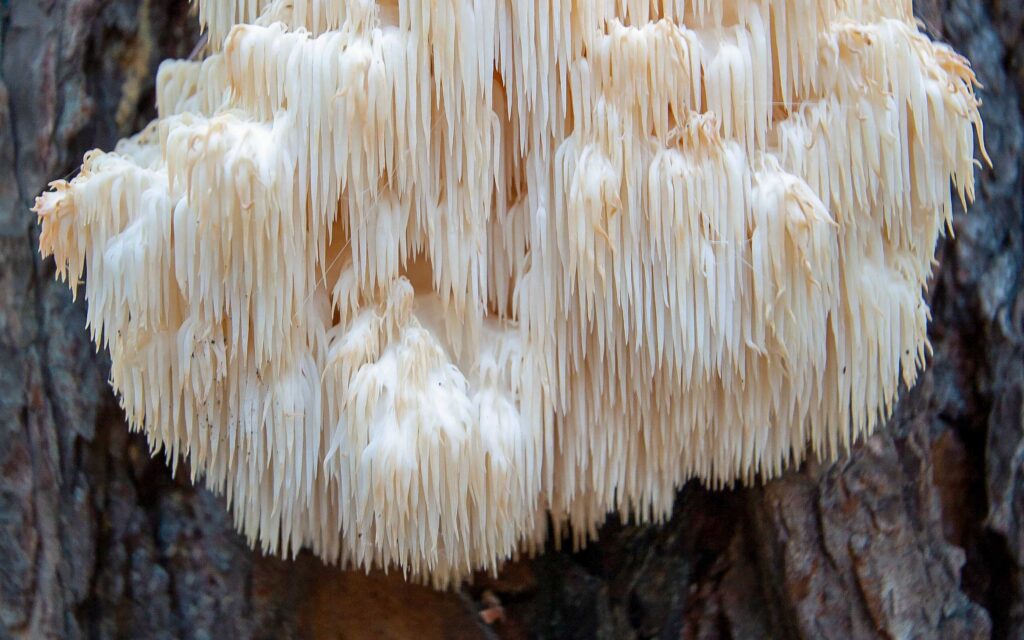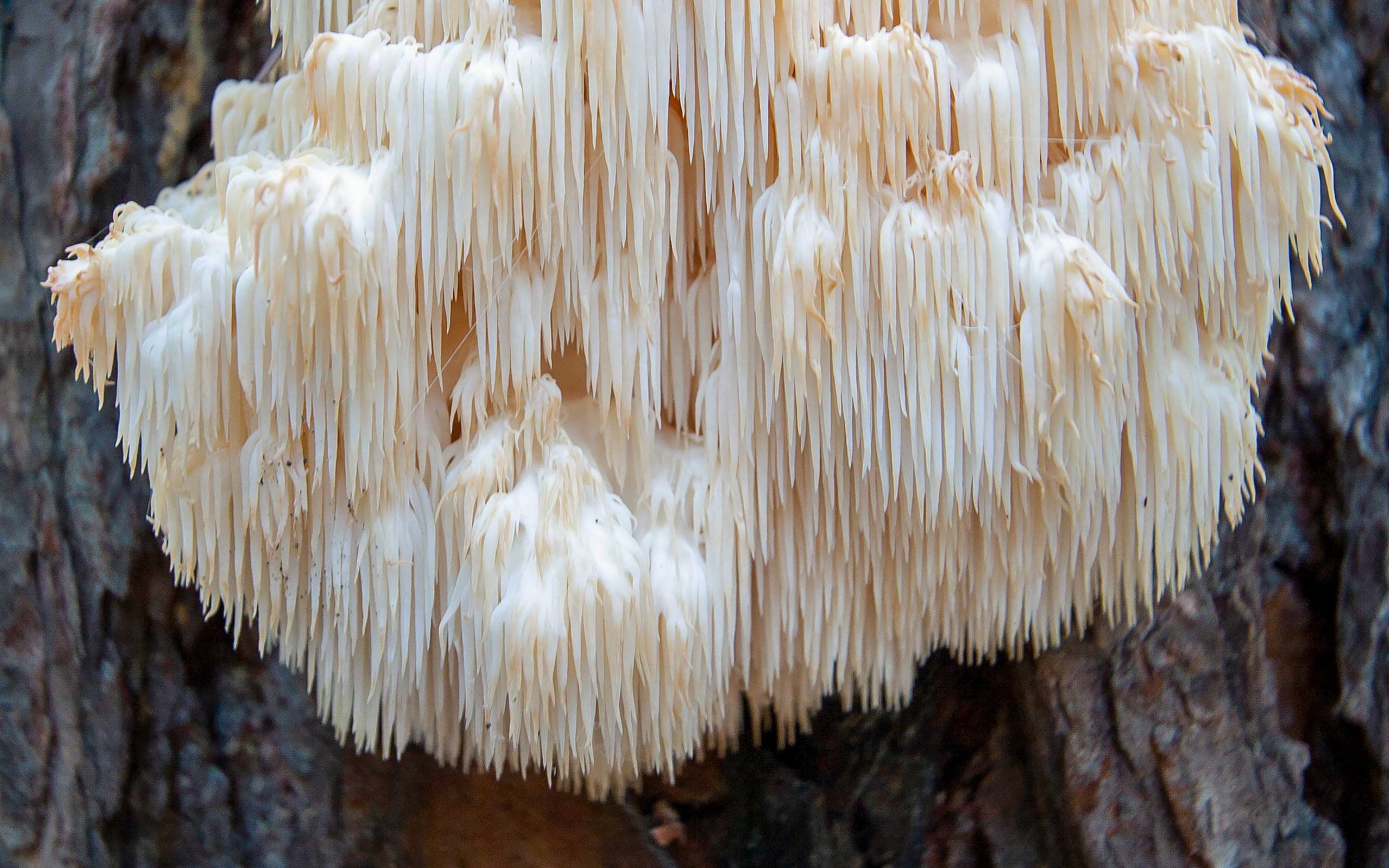
In recent years, there has been a growing interest in the potential health benefits of mushrooms. While many varieties are known for their immune-boosting and anti-inflammatory properties, Lion’s Mane mushrooms (Hericium erinaceus) have caught the attention of researchers for their powerful neuroprotective properties.
In this post, we’ll explore how mushrooms, particularly Lion’s Mane, can support brain health and cognitive function.
Lion’s Mane Mushrooms: A Brief Overview
Lion’s Mane mushrooms are a unique variety of mushrooms native to North America, Europe, and Asia. Their distinctive appearance, with cascading white spines resembling a lion’s mane, makes them easy to identify. Lion’s Mane has been used in traditional Chinese medicine for centuries to promote overall health and well-being, but it is their impact on brain health that has sparked the interest of modern researchers.
Neuroprotective Properties of Lion’s Mane Mushrooms
Lion’s Mane mushrooms contain a variety of compounds that have been shown to support brain health, including hericenones and erinacines. These bioactive substances can stimulate the production of nerve growth factor (NGF), a protein crucial for the maintenance, growth, and survival of neurons.
The increase in NGF production can promote neurogenesis, the process of creating new neurons, and strengthen existing neural connections, thus supporting overall cognitive function.
Memory and Cognitive Function
Research has shown that regular consumption of Lion’s Mane mushrooms can improve memory and cognitive function, particularly in older adults. A study conducted in 2009 on older adults with mild cognitive impairment found that consuming Lion’s Mane for 16 weeks led to significant improvements in cognitive function compared to a control group.
These improvements were lost once supplementation stopped, suggesting that the continued consumption of Lion’s Mane is necessary to maintain cognitive benefits.
Neurodegenerative Diseases
Given their neuroprotective properties, Lion’s Mane mushrooms have been investigated for their potential role in preventing or delaying the onset of neurodegenerative diseases, such as Alzheimer’s and Parkinson’s.
Animal studies have shown that Lion’s Mane can reduce amyloid-beta plaques, which are associated with Alzheimer’s disease, and improve motor function in mice with Parkinson’s disease. While more research is needed to confirm these findings in humans, the preliminary results are promising.
Anxiety and Depression
Lion’s Mane mushrooms may also have potential applications for mental health, specifically in treating anxiety and depression. In a 2010 study, researchers found that mice given Lion’s Mane extract exhibited reduced anxiety and depressive behaviors. The exact mechanisms behind these effects are not yet fully understood, but they may be linked to the mushroom’s ability to stimulate the production of NGF and promote neurogenesis.
Nerve Regeneration
Another exciting area of research is the potential for Lion’s Mane to support nerve regeneration. In a 2012 study, researchers found that rats treated with Lion’s Mane extract exhibited faster recovery from nerve injuries than those in the control group.
This suggests that Lion’s Mane may help to regenerate damaged nerves, offering potential applications for individuals recovering from injuries or dealing with neuropathy.
Conclusion
Mushrooms, particularly Lion’s Mane, offer a natural and promising approach to support brain health and cognitive function. Their strong neuroprotective properties, as demonstrated through research, make them an intriguing option for individuals looking to improve memory, protect against neurodegenerative diseases, or address mental health concerns.
While more research is needed to fully understand the extent of Lion’s Mane’s benefits, incorporating this unique mushroom into your diet may offer an exciting way to promote overall brain health.

Reference List:
Memory and Cognitive Function:
Mori, K., Inatomi, S., Ouchi, K., Azumi, Y., & Tuchida, T. (2009). Improving effects of the mushroom Yamabushitake (Hericium erinaceus) on mild cognitive impairment: a double-blind placebo-controlled clinical trial. Phytotherapy Research, 23(3), 367-372. https://doi.org/10.1002/ptr.2634
Neurodegenerative Diseases:
Alzheimer’s Disease:
Tsai-Teng, T., Chin-Chu, C., Li-Ya, L., Wan-Ping, C., Chung-Kuang, L., Chien-Chang, S., & Chi-Ying, H. F. (2016). Erinacine A-enriched Hericium erinaceus mycelium ameliorates Alzheimer’s disease-related pathologies in APPswe/PS1dE9 transgenic mice. Journal of Biomedical Science, 23(1), 49. https://doi.org/10.1186/s12929-016-0266-z
Parkinson’s Disease:
Kuo, H. C., Lu, C. C., Shen, C. H., Tung, S. Y., Hsieh, M. C., Lee, K. C., … & Chen, C. C. (2016). Hericium erinaceus mycelium and its isolated erinacine A protection from MPTP-induced neurotoxicity through the ER stress, triggering an apoptosis cascade. Journal of Translational Medicine, 14(1), 78. https://doi.org/10.1186/s12967-016-0831-y
Anxiety and Depression:
Nagano, M., Shimizu, K., Kondo, R., Hayashi, C., Sato, D., Kitagawa, K., & Ohnuki, K. (2010). Reduction of depression and anxiety by 4 weeks Hericium erinaceus intake. Biomedical Research, 31(4), 231-237. https://doi.org/10.2220/biomedres.31.231
Nerve Regeneration:
Wong, K. H., Kanagasabapathy, G., Naidu, M., David, R. P., & Sabaratnam, V. (2012). Effects of cultivation techniques and processing on antimicrobial and antioxidant activities of Hericium erinaceus (Bull.:Fr.) Pers. extracts. Food Technology and Biotechnology, 50(1), 47-55. http://www.ftb.com.hr/images/pdfarticles/2012/April-June/50_47-55.pdf
Please note that some of the studies involve animal models, and more research is needed to confirm these findings in humans.

